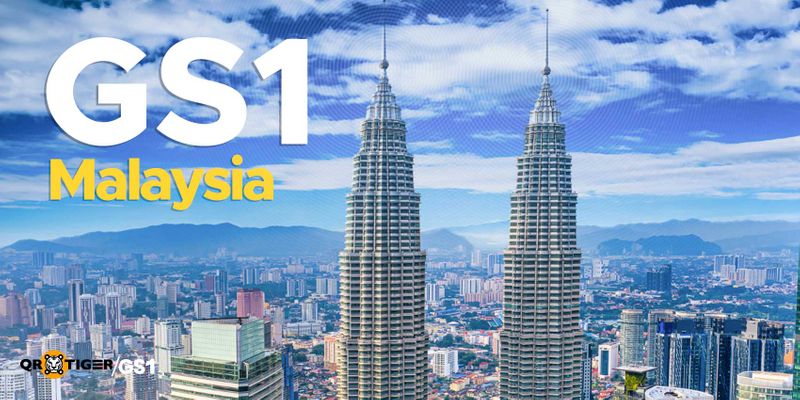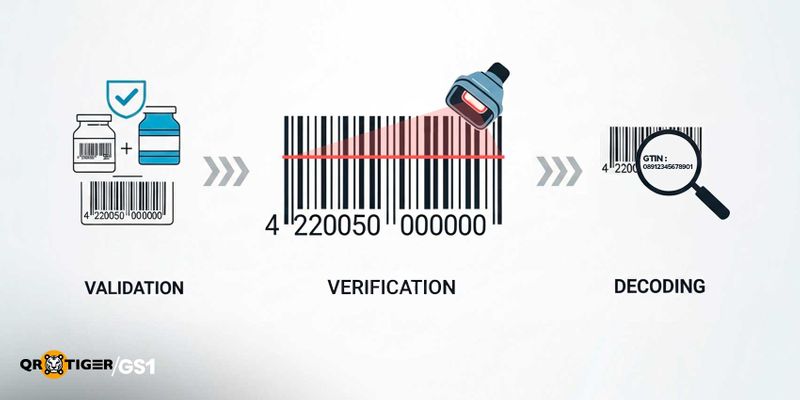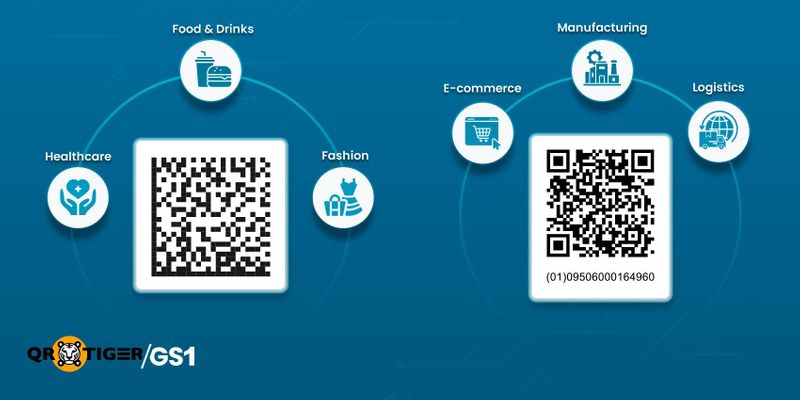GS1 Malaysia: Simplifying Product Traceability

Businesses operating in Malaysia are improving how they track products, meet safety rules, and build trust with customers. Whether it's food, medicine, or retail items, companies need clear and reliable product information that works across systems and industries.
GS1 Malaysia (MY) helps make this easier. It provides global barcode standards, smart tools, and support to help businesses manage product data, reduce mistakes, and improve supply chain visibility.
This blog will cover how GS1 MY supports industries through global barcode standards, product data management, and the move toward 2D barcodes, while also enabling better traceability, safer trade, and smoother operations across supply chains.
Table of Contents
What is GS1 Malaysia?
GS1 Malaysia Berhad is the sole authorized entity that provides barcodes and global identification standards in the country. The suffix “Berhad” (BHD) is a Malaysian legal term similar to “Limited” (Ltd.) or “Incorporated” (Inc.) used in other jurisdictions.
Established in 1988 as a not-for-profit Member Organization (MO) under the Federation of Malaysian Manufacturers (FMM).
They also provide barcode certification service to ensure products meet GS1 standards, supporting accurate identification and smooth trade operations.
These standards create a common foundation for smoother operations, better visibility, and safer, more efficient, and sustainable business practices across Malaysia.
GS1 MY equips businesses with trusted tools and services that open pathways to international collaboration and support long-term growth.
Contact information:
Address: GS1 Malaysia Berhad, Wisma FMM, No. 3 Persiaran Dagang, PJU 9, Bandar Sri Damansara, 52200 Kuala Lumpur
Contact no: +603-6286 7200
Email: gs1malaysia@gs1my.org
Introduced initiatives and collaborated campaigns
The member organization partners with industry leaders to make it easier for businesses to adopt global standards that drive growth and innovation.
GS1 MY and MBI for a sustainable future
GS1 MY’s collaboration with Malaysia Blockchain Infrastructure (MBI) indicates a step toward building reliable, circular, and export-ready supply chains.
Malaysian businesses can now integrate GS1 standards like GTIN (Global Trade Item Number), GLN (Global Location Number), SSCC (Serial Shipping Container Code), and EPCIS (Electronic Product Code Information Services) with MBI’s blockchain system to create secure, trusted product data.
This helps verify where a product came from, its recycled content, Halal status, and carbon footprint.
The collaboration allows smooth data collection, sharing, and checks throughout the supply chain, helping businesses meet EU DPP and EUDR rules.
This partnership provides practical benefits for exporters and manufacturers. GS1 MY provides standardized identifiers and clean master data. MBI offers easy testing tools, SDKs (software development kits), and Verifiable Credentials (VC) templates to help businesses get started quickly.
Businesses can test tracking tools with barcodes or RFID tags, automate ESG reports, and create reliable product records for buyers and regulators. This helps cut down disputes, speed up recalls, and provide access to green financing, especially for small businesses looking to grow sustainably.
KPDN and GS1 MY
On 9 October 2018, the Kementerian Perdagangan Dalam Negeri (KPDN or the Malaysian Ministry of Domestic Trade), top retailers, and GS1 MY launched a guidebook for brand owners.
It was called “Buku Panduan Kemasukan Produk Halal PKS Dalam Pasar Raya Besar Asing dan Tempatan Di Malaysia” (Guidebook for Halal SME Product Entry into Foreign and Local Hypermarkets in Malaysia).
The guide helps Halal SMEs or PKS understand requirements for entering retail markets, covering Halal certification, packaging, labeling, logistics, and application processes. It also highlights the role of GS1 Standards, such as GTINs and barcodes, in ensuring products are accurately identified, traceable, and ready for both local and international shelves.
GS1 Malaysia will keep working with KPDN to share this guide with local brand owners across the country.
GS1 MY services for businesses
GS1 MY plays a vital role in helping businesses enhance transparency, efficiency, and trust across supply chains. By offering globally recognized identification and data standards, it helps companies to meet regulatory requirements and consumer expectations with ease.
Verified by GS1 (VbG)& GACSS
GS1 runs a global service called Verified by GS1. At its core, it allows brand owners to register product data such as GTINs, brand names, product names, and packaging levels.
Retailers, regulators, and marketplaces then use this information to confirm whether a barcode is valid and tied to the right brand. Think of it as a global reference point for product identity.
Now, GS1 Malaysia takes that foundation and expands it into something more practical for local businesses: VbG & GACSS. This package includes the same product verification but goes further by supporting compliance, data sharing, and advanced barcode applications.
Here’s what GS1 MY adds on top of the basic verification:
- Submission of product, brand, certification, and company data into GS1’s trusted repositories
- Access to GS1’s 2D Track & Trace platform for capturing event data through GS1 DataMatrix
- China GAC Single Window GTIN filing support, a must-have for Malaysian exporters entering the Chinese market
- Access to the GLN Registry, which stores location and entity data
- Extra validation and security checks through GS1 MY’s managed portal
The goal is broader than simply verifying if a GTIN is authentic. GS1 MY’s package helps members comply with regulations, adopt 2D barcodes, and keep their product data flowing seamlessly across borders and trading systems.
In short:
- Verified by GS1 (global): A service to confirm if a GTIN is real and tied to the right brand.
- VbG & GACSS: Everything above, plus compliance support, 2D track-and-trace, China export filing, and registry access, is specifically structured for Malaysia-based businesses.
Databank Enhanced Services: Add-On
These are requests outside the Verified by GS1 & GACSS subscription. They are not part of the package, and each request has a fee.
Examples include:
- Extra product uploads: The subscription gives one free product data upload per month. Any uploads beyond this allowance fall under enhanced services.
- Data retrieval: Requesting a full copy of all previously submitted product information.
- GPC classification support: Aids in assigning the correct Global Product Classification (GPC) code. This means placing a product into the right category (Class) and specific type (Brick). For example, “Bottled Water” belongs to the Beverages Class and the Water Brick.
- Additional product images: The subscription covers 10 free images per company (up to 3 per product). Any image beyond this limit is part of enhanced services.
- Amendments: Correcting details of product information already submitted.
- Special characters: Uploading product names that include Chinese text, logograms, or symbols such as !, @, ?, &, %.
In short:
- VbG & GACSS subscription: Covers the baseline membership, tools, one free monthly upload, and 10 images.
- Databank Enhanced Services: Covers tasks outside the package, with fees applied per request.
Barcode Certification Program
The program operates in three stages: validation, verification, and decoding.
- Validation: This step checks that the correct barcode is placed on the correct product, from the correct company, with accurate details.
- Verification: It ensures your barcode scans smoothly every time, whether at a store, warehouse, or point-of-sale (POS) system.
- Decoding: The step examines the embedded code’s syntax to confirm the data is correct and follows GS1 standards.
Barcode Number Generation Service

This service allows businesses to request GS1 MY to create GTINs (barcode numbers) on their behalf. It is separate from regular membership and offered on an on-demand basis, often used when companies are unsure how to generate or structure GTINs correctly.
When a company applies for GS1 membership and licenses a Company Prefix, it gains the ability to generate GTIN-13 or GTIN-14 barcodes. The Barcode Number Generation Service supports this by providing different options to request and receive barcode numbers as needed.
In short, the service ensures products have unique, GS1-compliant codes that can be assigned quickly, helping businesses meet operational, retail, and global trade requirements.
Advisory Services
Membership Transfer
GS1 MY offers a License Transfer advisory service to help businesses keep their GS1 membership active and protect against misuse of barcode numbers and unauthorized resellers.
You can transfer your GS1 membership if your business is merging, changing its legal structure (e.g., sole proprietorship to Sdn Bhd), changing its name, selling its brand/product line, splitting into multiple entities, or relocating overseas.
Change of Company Name
GS1 MY supports a Change Name advisory service to help you keep your GS1 membership active and protect against misuse of barcode numbers and resellers.
You will need to update your company name in GS1 records if your business changes its name but keeps the same registration number. To begin, send the following documents to membership@gs1my.org:
- Official Change of Name document (e.g., Form 13)
- Proof of payment for the name change fee
Capacity Building & Implementation
The member organization has offered free orientation and premium consultation to companies of all sizes and industries. Support ranges from basic awareness sessions to advanced technical topics and custom in-house training.
No matter your company’s size or familiarity with GS1 standards, these sessions train you to solve business challenges and explore new opportunities. All consultations are conducted remotely via Zoom.
Business Consultancy Services
The member organization offers cost-effective, customized capacity-building sessions (conducted remotely via Zoom) to help you get the most out of GS1 Standards & Keys.
Regardless of your company’s size, you can get expert guidance and independent advice to enhance supply chain operations. Here are the key benefits:
- Improved operational efficiency
- More accurate business transactions
- Better inventory control
- Compliance with government product identification guidelines and specifications
Applications of 2D barcodes across industries in Malaysia
By 2027, the retail world will be moving toward smarter product labeling with 2D barcodes. Unlike traditional 1D barcodes, these advanced codes can carry much more information, helping improve product tracking and build stronger customer engagement.
Driven by the GS1 Sunrise 2027 initiative, this shift aims to make shopping more transparent and efficient, whether online or in stores. While the change isn’t mandatory yet, businesses can continue using 1D barcodes depending on their industry’s regulations.
To ease the transition, many companies are encouraged to use dual marking (adding both 1D and 2D barcodes to packaging). This keeps current systems running smoothly while preparing for future tech upgrades in retail.
To get ready for Sunrise 2027, companies have two main options: they can build GS1-compliant 2D barcodes themselves using GS1’s official guidelines, or they can turn to reliable third-party solutions like QR Tiger’s GS1 QR code generator.
For teams with limited time or tech skills, these external tools provide fast and reliable help with creating and applying new generation barcodes, making the shift easier.
Here are some of the key applications of these codes across industries in Malaysia:

Retail
2D barcodes are revolutionizing the retail industry by enabling faster, more informative point-of-sale experiences. They can carry rich data such as expiry dates, batch numbers, and promotional links.
Malaysian retailers benefit from enhanced traceability, granular inventory management, and efficient stock rotation.
For example, shoppers can scan a GS1 Digital Link QR code to access product details, reviews, and brand content instantly, connecting offline and online retail experiences, while supporting efficient replenishment and shelf-life management.
Logistics and supply chain
Scan4Transport is the GS1 standard for logistics and distribution. It enables shipment-related information, such as destination, hazard alerts, or delivery handling notes, to be embedded directly into a 2D barcode printed on transport labels. This makes scanning quicker, improves routing, and provides better visibility throughout the delivery chain.
Alongside this, the GS1 Digital Link takes the SSCC and other key data on a logistics label and converts it into URL form. This allows the 2D barcode to connect directly to online content.
For example, when GS1 QR code is scanned, partners can access shipment-specific information such as updated delivery status, handling instructions, or regulatory requirements. Instead of being restricted to static label data, the barcode becomes a gateway to richer, dynamic information across the supply chain.
Healthcare and pharmaceuticals
In the healthcare sector, GS1 DataMatrix plays a key role in patient safety and regulatory compliance. They track medicines and medical devices from manufacturer to patient, making it easier to handle product recalls, help stop fake products, and ensure correct use.
Hospitals and pharmacies use these codes to optimize inventory, verify authenticity, and meet Ministry of Health requirements. The ability to encode expiry dates and serial numbers directly into the barcode improves operational efficiency and protects public health.
Food and beverage
The food industry in the country uses GS1 2D barcodes to meet increasing demands for traceability, safety, and consumer transparency.
These next-generation barcodes powered by GS1 Digital Link can enable access to nutritional facts, allergen information, and sourcing details via a single scannable code, supporting regulatory compliance efforts and enhancing consumer trust through transparent product data.
GS1 MY helps food manufacturers use barcodes to track shelf life, manage recalls, and share content like sustainability stories or recipes. This enhances brand engagement and helps meet food safety protocols.
Supporting Malaysian Businesses with Global Standards
GS1 Malaysia plays a key role in helping businesses improve product traceability, meet regulatory standards, and operate more efficiently. Through its globally recognized barcode systems and services, it supports industries in adopting smarter, data-driven practices.
Registering with GS1 gives businesses reliable tools, expert help, and global standards that make products easier to track, reduce mistakes, and build customer trust. As part of the Sunrise 2027 initiative to support 2D barcode scanning at retail POS by 2027, GS1 helps Malaysian businesses prepare with smarter tools and easier product tracking.
Frequently asked questions
1. How does GS1 MY differ from unauthorized barcode resellers?
GS1 MY is the only authorized source of barcodes in the country. When you apply through GS1, the numbers you receive are registered under your company name in GS1’s global database. This ensures your products are uniquely identified and accepted by major retailers, marketplaces, and regulators worldwide.
Unauthorized resellers, on the other hand, sell either “grandfathered” numbers that still point to another company in GS1 records, or recycled and made-up codes that are not valid. In both cases, your products can be rejected, delisted, or flagged because the barcode does not properly link back to your business.
2. How can I get a GS1 barcode in Malaysia?
Step 1: Apply for membership and request a GS1 Company Prefix. Submit required documents and payment.
Step 2: Submit a barcode number request. Say how many GTIN-13 or GTIN-14 numbers you need., GS1 MY typically issues barcode numbers in 3 to 5 working days.
3. Can the same barcode be used again for a different product?
No, once a barcode is assigned to a product, it must not be reused. That number stays permanently linked to the original item, even if it’s discontinued. Reusing it can cause mix-ups in retail systems, affect inventory tracking, and lead to compliance issues, especially in regulated industries.
DISCLAIMER: We acknowledge that GS1, as well as the materials, proprietary items, and all related patents, copyright, trademark, and other intellectual property (collectively, “intellectual property”) relating to its use, are the property of GS1 Global, and that our use of the same shall be in accordance with the conditions provided by GS1 Global.




